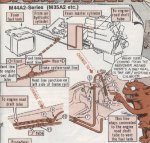Rattlehead
Member
- 645
- 3
- 18
- Location
- Michigan
Getting the truck ready for a trail ride, planned to leave Friday. Brake fluid was slightly down since I checked it sometime last year (has been sitting for months), but brakes were fine. Topped it off, drove it around last night, drove it to work and back today, no problems, will lock up the tires. Seems to have a pinch of air in the lines, as if it sits for awhile the pedal isnt as firm on the first apply as is the second, though it still will stop the truck no problems.
Decided to do a quick brake bleeding today, got a nice looking soldierette #2 (g/f) to help me. Bled the airpack, 3 of the rear axles, then on the last rear axle end the thing sprayed brake fluid out the air exhaust in the downdraft tube. Truck was not running, I hooked the air system up to my compressor so we could hear each other. Air system was at about 85 psi. Scratched my head, tried it again, seemed to work ok and then it sprayed again. Pedal has been hard the entire process, and tons of fluid out of each bleeder. Do I need a new airpack? Why is it intermittent? I did pull the lubrication plug in the back of the airpack, and no brake fluid came out or anything.
It does not do this every time. In fact, I then tried applying/releasing the brake countless times after this, without opening bleeders, and no problems. Now I am wondering if I just let too much fluid out / too fast when opening a bleeder, and somehow caused something to happen in the airpack? I have never had one apart, but am envisioning a control valve/diaphram bottoming out beyond its normal travel, or something to that effect? It did seem that it only sprayed when I got aggressive in opening the bleeder a lot and letting the fluid fly. What is going on?
Decided to do a quick brake bleeding today, got a nice looking soldierette #2 (g/f) to help me. Bled the airpack, 3 of the rear axles, then on the last rear axle end the thing sprayed brake fluid out the air exhaust in the downdraft tube. Truck was not running, I hooked the air system up to my compressor so we could hear each other. Air system was at about 85 psi. Scratched my head, tried it again, seemed to work ok and then it sprayed again. Pedal has been hard the entire process, and tons of fluid out of each bleeder. Do I need a new airpack? Why is it intermittent? I did pull the lubrication plug in the back of the airpack, and no brake fluid came out or anything.
It does not do this every time. In fact, I then tried applying/releasing the brake countless times after this, without opening bleeders, and no problems. Now I am wondering if I just let too much fluid out / too fast when opening a bleeder, and somehow caused something to happen in the airpack? I have never had one apart, but am envisioning a control valve/diaphram bottoming out beyond its normal travel, or something to that effect? It did seem that it only sprayed when I got aggressive in opening the bleeder a lot and letting the fluid fly. What is going on?



